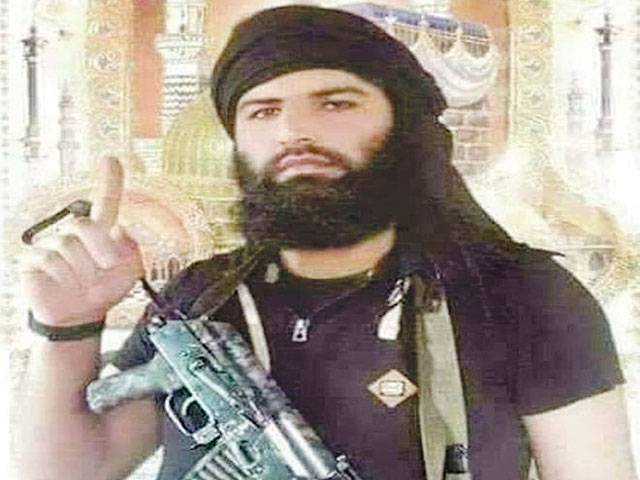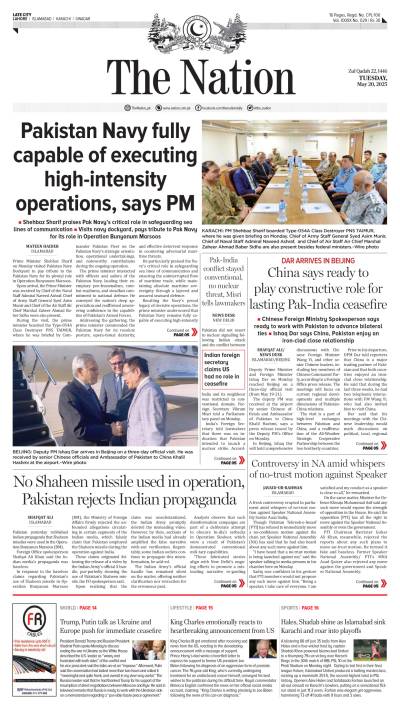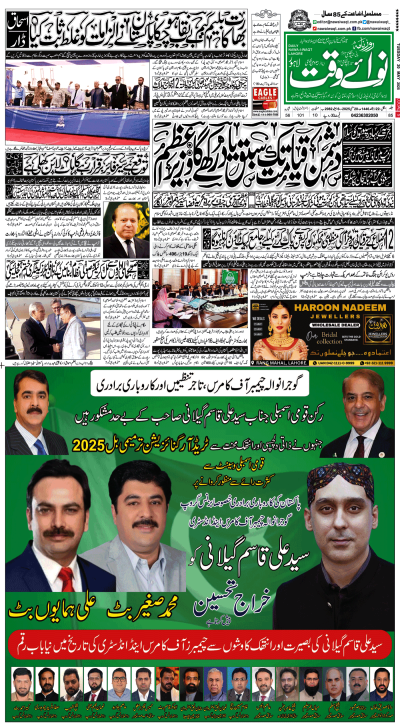SRINAGAR/ISLAMABAD - Violent anti-India protests engulfed Occupied Kashmir on Saturday after Indian forces killed a top Hizbul Mujahideen commander.
The killing of Sabzar Ahmad Bhat who commanded a loyal following among local youths sparked clashes in several cities of Held Kashmir resulting in death of 12 more people.
Indian authorities imposed a curfew in Srinagar and other cities as violence spread across the restive region.
Condemning the Indian aggression, Pakistan urged the international community, particularly the United Nations, Organisation of Islamic Conference, P-5 members and human rights organisations to take notice of the situation in Held Kashmir and force India to immediately stop the pogrom of the defenceless Kashmiri youth.
Bhat, head of the Hizbul Mujahideen, was killed in a gunfight with government forces in Tral area, some 40 kilometres south of Srinagar.
One of Bhat's fighters was also killed in the gunbattle, which erupted late Friday after government forces cordoned off a village following an intelligence tip-off.
Police said hundreds of villagers tried to break the cordon by throwing rocks at security forces.
Clashes between rock-throwing protesters and government forces erupted in different places in the area, with police and paramilitary soldiers firing shotgun pellets and tear gas to stop the protests.
A police official, speaking on condition of anonymity, told AFP that several protesters were killed after troops opened fire on the villagers.
Dozens of civilians were reported injured in the clashes. Police said at least 25 police officers and paramilitary soldiers were also injured.
The nearly 16-hour gunfight ended early Saturday when Bhat and his associate were killed. "Yes, both of them were gunned down and the operation is still going on," police chief Shesh Pal Vaid told AFP.
As the news of the killing spread in the region, thousands of people, including students, took to the streets shouting “Go India, go back” and “We want freedom.”
BAN ON SOCIAL MEDIA, INTERNET
Soon after Indian security forces killed Hizb leader, the Jammu and Kashmir (J&K) government decided to again cut mobile internet services and social media website like Facebook and Twitter, a mere 12-odd hours after an earlier month-long internet ban had ended.
APHC CALLS FOR STRIKE
Kashmiri leaders who challenge India’s sovereignty over Kashmir called for a general strike on Sunday and Monday.
On Saturday, in a separate incident, the Indian army said it had killed six rebels who had infiltrated across the border from Pakistan in the Himalayan region.
Condemning the killing of 12 Kashmiri youth by the Indian occupation forces in the Occupied Kashmir, Adviser to Prime Minister on Foreign Affairs Sartaj Aziz urged the international community, particularly the United Nations, Organisation of Islamic Conference, P-5 members and human rights organisations to force India to immediately stop the pogrom of the defenceless Kashmiri youth.
The Indian occupation forces had martyred 12 Kashmiri youth since Friday in Pulwama and Baramulla, three of them were martyred extra-judicially, as has been the common practice in the Held Kashmir.
Aziz reaffirmed the government and the people of Pakistan’s unflinching support for their Kashmiri brethren in IoK in their just struggle for the right to self-determination as promised to them in the relevant UN Security Council’s resolutions on Kashmir.
India has banned the social, electronic and print media to prevent reports of brutalities against Kashmiris from reaching the outside world. Despite this media blackout, the atrocities being committed in Indian Occupied Kashmir (IoK) are being reported in Indian and international media. These brutalities are also being increasingly criticised in many parliaments around the world, he underscored.
“India has been heightening tension at the LoC to hide these crimes against the innocent Kashmiris being perpetrated with impunity,” Aziz further said. He expressed grave concern at the constant ceasefire violations by Indian forces at LoC and the targeting of innocent Kashmiris in Azad Jammu and Kashmir.
In their desperation to hide the reality of indigenous uprising of young Kashmiris, including by tens of thousands of girls and boys, India is trying to equate it with terrorism. The facts have repeatedly come out proving that indigenous Kashmiris were killed by Indian occupation forces in ‘fake encounters’ and ‘buried’, claiming them to be ‘infiltrators’ from across LoC, the Adviser reminded.
In its latest effort to discredit the Kashmiri indigenous movement and justify its massive military action to wipe out Kashmiris, it is now bringing in the bogey of Daesh's presence in Indian occupied Jammu and Kashmir. He said that it is also India’s plan to gradually change the demography of the Indian occupied Jammu and Kashmir to convert the majority Kashmiri into minority territory has also been brought to the attention of the United Nations Security Council. The UNSC President has circulated adviser's letter in this regard.
How many more Kashmiris would India kill so mercilessly? If India thinks, Aziz said, by killing more and more Kashmiri youth India would suppress the Kashmiris movement for their right of self-determination, it has not learnt any lessons from history.
Hizbul Mujahideen is the largest indigenous Kashmiri group fighting against Indian-rule in the Himalayan territory since an armed struggle broke-out in 1989.
Bhat succeeded charismatic leader Burhan Wani after he was killed in a gunfight in July, which triggered months of anti-India protests in which nearly 100 people died.
Wani's popularity grew after he extensively used social media to post pictures of himself and of other gun-wielding young fighters in army fatigues to attract new recruits for the Kashmiri group that has seen its ranks swell in recent years.
Anti-India sentiment runs deep in the predominantly Muslim Kashmir valley, one of the world's most heavily militarised areas, where most people favour independence or a merger with Pakistan.
Kashmir has been divided between India and Pakistan since the end of British rule in 1947 but both claim the territory in its entirety.
Condemning the killing of 12 Kashmiri youth by the Indian occupation forces in the Occupied Kashmir, Adviser to Prime Minister on Foreign Affairs Sartaj Aziz urged the international community, particularly the United Nations, Organisation of Islamic Conference, P-5 members and human rights organisations to force India to immediately stop the pogrom of the defenceless Kashmiri youth.
The Indian occupation forces had martyred 12 Kashmiri youth since Friday in Pulwama and Baramulla, three of them were martyred extra-judicially, as has been the common practice in the Held Kashmir.
Aziz reaffirmed the government and the people of Pakistan’s unflinching support for their Kashmiri brethren in IoK in their just struggle for the right to self-determination as promised to them in the relevant UN Security Council’s resolutions on Kashmir.
India has banned the social, electronic and print media to prevent reports of brutalities against Kashmiris from reaching the outside world. Despite this media blackout, the atrocities being committed in Indian Occupied Kashmir (IoK) are being reported in Indian and international media. These brutalities are also being increasingly criticised in many parliaments around the world, he underscored.
“India has been heightening tension at the LoC to hide these crimes against the innocent Kashmiris being perpetrated with impunity,” Aziz further said. He expressed grave concern at the constant ceasefire violations by Indian forces at LoC and the targeting of innocent Kashmiris in Azad Jammu and Kashmir.
In their desperation to hide the reality of indigenous uprising of young Kashmiris, including by tens of thousands of girls and boys, India is trying to equate it with terrorism. The facts have repeatedly come out proving that indigenous Kashmiris were killed by Indian occupation forces in ‘fake encounters’ and ‘buried’, claiming them to be ‘infiltrators’ from across LoC, the Adviser reminded.
In its latest effort to discredit the Kashmiri indigenous movement and justify its massive military action to wipe out Kashmiris, it is now bringing in the bogey of Daesh's presence in Indian occupied Jammu and Kashmir. He said that it is also India’s plan to gradually change the demography of the Indian occupied Jammu and Kashmir to convert the majority Kashmiri into minority territory has also been brought to the attention of the United Nations Security Council. The UNSC President has circulated adviser's letter in this regard.
How many more Kashmiris would India kill so mercilessly? If India thinks, Aziz said, by killing more and more Kashmiri youth India would suppress the Kashmiris movement for their right of self-determination, it has not learnt any lessons from history.
Hizbul Mujahideen is the largest indigenous Kashmiri group fighting against Indian-rule in the Himalayan territory since an armed struggle broke-out in 1989.
Bhat succeeded charismatic leader Burhan Wani after he was killed in a gunfight in July, which triggered months of anti-India protests in which nearly 100 people died.
Wani's popularity grew after he extensively used social media to post pictures of himself and of other gun-wielding young fighters in army fatigues to attract new recruits for the Kashmiri group that has seen its ranks swell in recent years.
Anti-India sentiment runs deep in the predominantly Muslim Kashmir valley, one of the world's most heavily militarised areas, where most people favour independence or a merger with Pakistan.
Kashmir has been divided between India and Pakistan since the end of British rule in 1947 but both claim the territory in its entirety.






